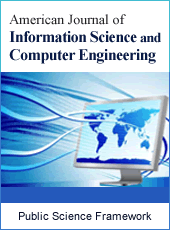American Journal of Information Science and Computer Engineering
Articles Information
American Journal of Information Science and Computer Engineering, Vol.6, No.4, Dec. 2020, Pub. Date: Dec. 24, 2020
Research on Tight Relationship Based on Social Network
Pages: 24-27 Views: 1663 Downloads: 292
[01]
Wenming Xia, School of Information Engineering, Yancheng Teachers University, Yancheng, China.
[02]
Jiacheng Ni, School of Information Engineering, Yancheng Teachers University, Yancheng, China.
[03]
Fengrui Zhang, School of Information Engineering, Yancheng Teachers University, Yancheng, China.
[04]
Fan Yang, School of Information Engineering, Yancheng Teachers University, Yancheng, China.
[05]
Weixuan Yan, School of Information Engineering, Yancheng Teachers University, Yancheng, China.
[06]
Hao Yang, School of Information Engineering, Yancheng Teachers University, Yancheng, China; Jiangsu Provincial Key Constructive Laboratory for Big Data of Psychology and Cognitive Science, Yancheng Teachers University, Yancheng, China.
This paper focuses to study the relationship network of different dimensions of students’ individual data in school through social network theory, and conduct real-time event trajectory tracking. It takes the correlation degree of college students in school as the research object, and takes the association relationship of different dimensions of data of individual students in school as the target, such as the situation of card swiping in different places, freshmen questionnaire survey, mental health consultation, poverty subsidy, scholarship, achievement, and students' origin, and constructs the close relationship network between them by using social network theory. This paper studies the modeling method, verification method and feature analysis of the closely related network. Through the construction of close relationship network, it provides a more comprehensive and in-depth research dimension for students' intimate relationship, and is conducive to more targeted development of questionnaires and scales on mental health and personality formation, so as to better serve local colleges and universities in-depth understanding and analysis of college students' learning and physical and mental health. According to our feature analysis of the tight relationship network, this paper proposes the modeling method and verification method which provides effective theoretical and technical support for the research on the close relationship formed by college students in school, and provides relevant questionnaires research and scale development provide strong data support.
Social Network, Tight Relationship Network, College Students Relationship
[01]
Wu-Han H. A Collaborative Filtering Algorithm Based on Users' Social Relationship Mining in Mobile Communication Network [J]. Journal of Electronics & Information Technology, 2011.
[02]
Jun-Ping Q, Wei L I. Study on the Relationship of Bloggers and Commentators Based on the Social Network Analysis —— Take the Web of Science Blog as Example [J]. Information ence, 2012.
[03]
Khadangi E, Zarean A, Bagheri A, et al. Measuring relationship strength in online social networks based on users' activities and profile information [J]. 2013: 461-465.
[04]
Li X, Tan Y, Zhang Z, et al. Community Detection in Large Social Networks Based on Relationship Density [C]// Computer Software & Applications Conference. IEEE, 2016.
[05]
Yulan H, Ling L. Analysis of user influence in social network based on behavior and relationship [C]// International Conference on Measurement. IEEE, 2014.
[06]
Ai-Ming L I. Research on Author Collaboration Relationship in Domestic Digital Library Field Based on Social Network [J]. Information ence, 2013.
[07]
Zhang L, Wen Y, Zhang H, et al. User relationship index based on social network community analysis [C]// International Conference on Business Management & Electronic Information. 2019
[08]
Kun, NIU, Haizhen, et al. NFRR: A Novel Family Relationship Recognition Algorithm Based on Telecom Social Network Spectrum[J]. ICE Transactions on Information and Systems, 2019.
[09]
Wu J, Nakamoto Y. RelSeeker: Relationship-based Query Language in a Graph Database for Social Networks[C]// 2019 Sixth International Conference on Social Networks Analysis, Management and Security (SNAMS). 2019.
[10]
Wu J, Li J, Ma Y. Exploring the Relationship between Potential and Actual of Urban Waterfront Spaces in Wuhan Based on Social Networks [J]. Sustainability, 2019, 11.
[11]
Yang L. Research on Authors' Co-authoring Relationship in the Field of Library and Information Based on Social Network Analysis [J]. Journal of the Library ence Society of Sichuan, 2019.
[12]
Ding R X, Wang X, Shang K, et al. Social network analysis-based conflict relationship investigation and conflict degree-based consensus reaching process for large scale decision making using sparse representation[J]. An international journal on information fusion, 2019.
[13]
Lizana M, Carrasco J A, Tudela A. Studying the relationship between activity participation, social networks, expenditures and travel behavior on leisure activities[J]. Transportation, 2019(3).
[14]
Fareri D S, Smith D V, Delgado M R. The influence of relationship closeness on default-mode network connectivity during social interactions[J]. Social Cognitive and Affective Neuroence.
[15]
Chen X, Chen Y, Guo S. Relationship between Organizational Legitimacy and Customer Citizenship Behavior: A Social Network Perspective [J]. Social Behavior and Personality: an international journal, 2019, 47.

ISSN Print: 2381-7488
ISSN Online: 2381-7496
Current Issue:
Vol. 7, Issue 3, September Submit a Manuscript Join Editorial Board Join Reviewer Team
ISSN Online: 2381-7496
Current Issue:
Vol. 7, Issue 3, September Submit a Manuscript Join Editorial Board Join Reviewer Team
| About This Journal |
| All Issues |
| Open Access |
| Indexing |
| Payment Information |
| Author Guidelines |
| Review Process |
| Publication Ethics |
| Editorial Board |
| Peer Reviewers |


